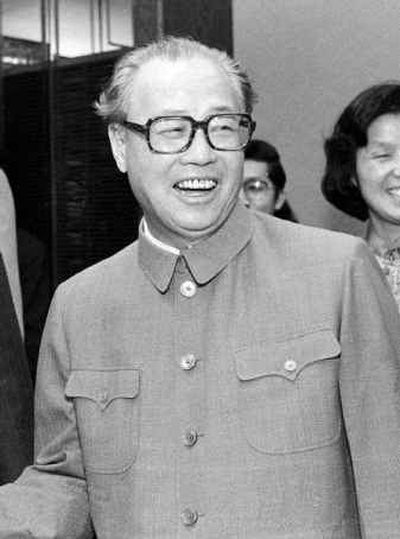Deposed Chinese official ill, activist says

BEIJING – Zhao Ziyang, the Chinese Communist Party leader deposed after tearfully sympathizing with the 1989 Tiananmen Square pro-democracy protests, was hospitalized in a coma Saturday and may be near death, a human rights activist said.
Zhao, 85, went into shock from a lung ailment, said Hong Kong-based activist Frank Lu. He said Zhao was hospitalized for lung problems, citing Zhao’s daughter Wang Yannan as his source. “He’s still in a deep coma,” said Lu, who said he’d spoken to Wang late Saturday.
Earlier this week, China denied a report in a Hong Kong newspaper that Zhao had died – an extremely rare disclosure by the government, which usually refuses requests for information about the ousted leader.
The government’s reticence to speak about Zhao until now is a sign of Communist Party fears that his death could spark widespread discontent because of his enduring strength as a symbol of political liberalism.
Zhao has spent more than 15 years under house arrest since he was purged from the party leadership. He was accused of sympathizing with hunger strikers in Tiananmen Square who, for seven weeks, had demanded democratic reforms and the resignation of then-Premier Li Peng.
He was last seen in public on May 19, 1989, when he visited the square to talk to student hunger strikers, one day before martial law was declared.
“I have come too late,” he apologized, in tears. Sources said then that Zhao, who was opposed to a crackdown, had offered his resignation.
Two weeks later, China launched a bloody military crackdown. Troops armed with truncheons, tear gas and machine guns began their assault on the demonstrators, killing hundreds, perhaps thousands. Tanks rumbled into Tiananmen Square, advancing over bodies.
Andrew Nathan, a specialist on Chinese politics at Columbia University, said Chinese leaders remember how the death of Hu Yaobang in 1989 sparked the Tiananmen demonstrations which led to Zhao’s ouster. Hu was a former Communist Party chief fired in 1987 for allowing pro-democracy student unrest. Zhao replaced him.
“The death of Zhao could well become a triggering incident or a spark that would – just like the death of Hu – create an opportunity and an emotional focus point for all kinds of dissatisfied elements to express themselves and to congeal into a larger force,” Nathan said.
Lu appealed for Premier Wen Jiabao, Zhao’s former aide, to visit him in his last hours.
Wen, who had stood at Zhao’s side as he apologized to the Tiananmen protesters, didn’t answer directly in 2003 when he was asked about Zhao’s ouster. Instead, he praised China’s economic success, implying that the crackdown was justified because of the political stability it brought.
Before he was purged, Zhao was the chosen successor of then-supreme leader Deng Xiaoping. Spearheading bold economic reforms, the dapper Zhao, who often wore tailored Western suits, was the articulate public face of the party’s struggle with social and political change in the late 1980s.
In recent years, Chinese leaders have tried to suppress demands that they declare the 1989 protests a patriotic movement, overturning the verdict that they were anti-government riots that had to be crushed.
Human rights groups say pressure has been mounting for Zhao’s release, as a growing number of Chinese officials are sympathetic to him.